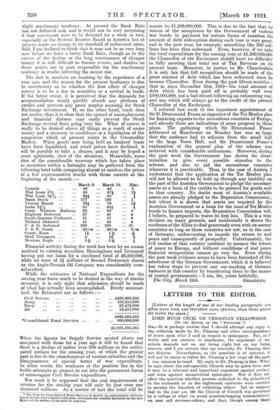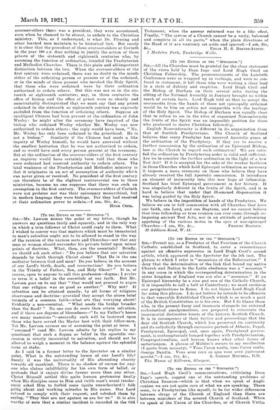LETTERS TO THE EDITOR.
[Letters of the length of one of our leading paragraphs are often more read, and therefore more effective, than those which fill treble the space.] LORD HUGH CECIL ON CHRISTIAN FELLOWSHIP. (To THE EDITOR Or THE " SPECTATOR."]
Sm.—It is perhaps unwise that I should attempt any reply to the criticism made by Dr. Fleming and other correspondents of yours upon what I said in respect to episcopacy. For, as I wrote and am anxious to emphasize, the argument of my article depends not on my being right but on my being sincere, and I am certain that my sincerity Dr. Fleming does not dispute. Nevertheless, as the question is of interest, it will not be amiss to follow Dr. Fleming a few steps off the path I was anxious to tread. My reply to Dr. Fleming is this : What he says about the sub-apostolic Church may be quite true. and it may be a relevant and important argument against prelacy and even against monarchical episcopacy. But it does not affect the question whether persons ordained to the priesthood in the sixteenth or in the eighteenth centuries were entitled to assume the function of ordaining others Let us suppose that in the year A.D. 100 the Church of Corinth was governed by a college of what (to avoid question-begging nomenclature) we mar call overseer-elders; and that, though among those overseer-elders thera was a president, they were accustomed, even when he chanced to be absent, to ordain to the Christian ministry. This, as I understand, is what Dr. Fleming and other learned men maintain to be historical fact. But surely it is clear that the precedent of these overseer-elders at Corinth in the year 100 A.D. does nothing to justify the action of those priests of the sixteenth and eighteenth centuries who, by assuming the function of ordination, founded the Presbyterian and Methodist Churches. There is this plain and all-important distinction between the two. When the overseer-elders of the first century were ordained, there was no doubt in the minds either of the ordaining person or persons or of the ordained, or in the minds of those present who invoked the Holy Spirit, that those who were ordained were by their ordination authorized to ordain others. But this was not so in the six- teenth or eighteenth centuries; nay, in those centuries the office of bishop and the office of priest were so clearly and unmistakably distinguished that we must say that any priest ordained in the sixteenth or eighteenth century was expressly excluded from the function of ordaining others. Suppose an intelligent Chinese had been present at the ordination of John Wesley : he might after the ceremony have inquired of the bishop who ordained Wesley whether Mr. Wesley was now authorized to ordain others : the reply would have been, "No. Mr. Wesley has only been ordained to the priesthood. He is not a bishop." Similarly if the Chinese had made a like inquiry of Wesley himself, he would have answered without the smallest hesitation that he was not authorized to ordain, and so would have said every person present at the ceremony. But at the ordination of the overseer-elders of the first century an inquirer would have certainly been told that those who
were ordained had received authority to ordain others. The fatal weakness of the Presbyterian and Methodist ministry is that it originates in an act of assumption of authority which
was never given or received. No precedent of the first century can therefore be of the slightest controversial use to those
ministries, because no one supposes that there was such an assumption in the first century. The overseer-elders of Corinth were not prelates nor Was their episcopacy monarchical, but in modern language they were bishops. For they had received at their ordination power to ordain.—I am, Sir, &c.,
HUGH CECIL.



































 Previous page
Previous page